|
|
|
Sort Order |
|
|
|
Items / Page
|
|
|
|
|
|
|
| Srl | Item |
| 1 |
ID:
193483
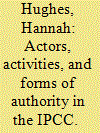

|
|
|
|
|
| Summary/Abstract |
Scholarship on global environmental assessments call for these organisations to become more reflexive to address challenges around participation, inclusivity of perspectives, and responsivity to the policy domains they inform. However, there has been less call for reflexivity in IPCC scholarship or closer examination of how routine concepts condition scholarly understanding by focusing on science and politics over other social dynamics. In this article, I suggest that scholarly reflexivity could advance new analytical approaches that provide practical insights for changing organisational structures. Through reflecting on my understanding of the IPCC, I develop actors, activities, and forms of authority as a new analytical framework for studying international organisations and knowledge bodies. Through its application, I describe the social order of the IPCC within and between the panel, the bureau, the technical support units, the secretariat and the authors, which is revealing of which actors, on the basis of what authority, have symbolic power over the writing of climate change. The fine-grained analysis of organisations enabled by this analytical framework reveals how dominance can and is being remade through intergovernmental relations and potentially, identifies avenues that managers of these bodies can pursue to challenge it.
|
|
|
|
|
|
|
|
|
|
|
|
|
|
|
|
| 2 |
ID:
121731
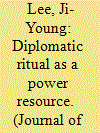

|
|
|
|
|
| Publication |
2013.
|
| Summary/Abstract |
What explains Korea's success in surviving as an independent state for over 2,000 years, not annexed to China, when it shares a border with this powerful imperial neighbor? I argue that diplomatic ritual can be conducive to managing asymmetric power relations and that the Korean state and the Chinese state prior to the nineteenth century used the diplomatic ritual of investiture in a strategic manner as a signaling mechanism to manage the expectations of each side. Drawing insights from ritual studies, I offer three specific mechanisms: (1) regularity and precision, (2) strategic ambiguity, and (3) the manipulation of symbols, through which the ritualization of power relations reduces the tension arising from the disparity in power. The empirical evidence comes from an investigation of a total of sixteen investiture cases between Choso n Korea and Ming China between 1392 and 1644. It shows that the granting and seeking of investiture on both sides was not only a way of signaling their commitment to the status quo, but also a medium of negative soft power through which the stronger side could change the status quo relations to its favor using the symbolic power embedded in the investiture ritual.
|
|
|
|
|
|
|
|
|
|
|
|
|
|
|
|
| 3 |
ID:
160833
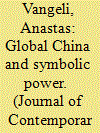

|
|
|
|
|
| Summary/Abstract |
This article analyzes the practice and effects of China’s new foreign policy by applying a research framework inspired by Bourdieu(s)ian international political sociology centered on the notion of symbolic power. To analyze China’s symbolic power in action, the article uses the case of the cooperation between China and the 16 countries of Central, East, and Southeast Europe, dubbed ‘16 + 1’. It discusses how, through symbolic domination that rests on concealing the true meaning of the cooperation, China contributes to changes in the established notions on boundaries, historical legacies, and development paradigms in the region of Central and Eastern Europe (CEE).
|
|
|
|
|
|
|
|
|
|
|
|
|
|
|
|
| 4 |
ID:
116182
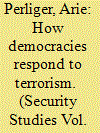

|
|
|
|
|
| Publication |
2012.
|
| Summary/Abstract |
While the academic study of counterterrorism has gained momentum in recent years, it still suffers from major theoretical weaknesses. One of the most prominent shortcomings is an absence of theories that can effectively explain the factors that shape the counterterrorism policies of democratic regimes. The present study attempts to fill this theoretical void in two ways. First, it proposes an analytical framework for a classification of counterterrorism policies. Second, it presents a theoretical framework that strives to uncover the factors that have influenced the struggle against domestic terrorism in democratic regimes. The analyses, which have used a unique and comprehensive dataset that documents counterterrorism policies in eighty-three democracies, show that the robustness of the regime's democratic foundations as well as the symbolic effect of terrorism are major forces in shaping the democratic response to it, while the direct impact of terrorism is less influential than assumed in the literature.
|
|
|
|
|
|
|
|
|
|
|
|
|
|
|
|
| 5 |
ID:
051457
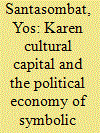

|
|
|
| 6 |
ID:
101607
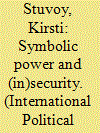

|
|
|
|
|
| Publication |
2010.
|
| Summary/Abstract |
The general role of symbolic power in contributing to the legitimacy of security has been acknowledged, and this article seeks, more specifically, to advance the understanding of gendered power dynamics and (in)security. It demonstrates how, through their first decade of existence, nonstate crisis centers in Northwest Russia contributed to security but also to the (unintentional) marginalization of women's security. Their emphasis on victims acting on their own behalf, inducing them to becoming acting subjects, is a misrecognition of the effect of symbolic power in this field. The refusal by the Russian (patriarchal) legislature of anti-domestic violence law, combined with the hesitancy of public institutions' personnel (doctors, police, judges) to provide support for women, gives the local crisis centers, which lacked financial resources, little choice about which intervention strategies to prioritize while emphasizing women's personal responsibility.
|
|
|
|
|
|
|
|
|
|
|
|
|
|
|
|
| 7 |
ID:
141725
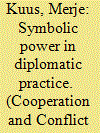

|
|
|
|
|
| Summary/Abstract |
This paper investigates the workings of symbolic power in diplomatic practice. At the level of empirical observation, it focuses on the intangible and incalculable ‘feel for the game’ that distinguishes a well-informed and relaxed insider from an ill-informed and ill-at-ease outsider in European Union (EU) diplomatic circles in Brussels. By highlighting the play of social resources, such as reputation, presence, poise, and composure in these circles, I examine EU diplomacy from an angle – symbolic power – that is often overlooked in the existing work on that field. Conceptually, the analysis focuses on the role of informal social resources rather than formal institutional structures in diplomatic practice. It also outlines the potential synergies between the study of diplomacy in international relations (IR) on the one hand and geography, anthropology, and sociology on the other. The paper thereby advances the analytical toolbox of diplomatic studies and practice theory. Such conceptual sharpening is needed, especially now that diplomacy is becoming more transnational and less linked to the foreign ministries of states.
|
|
|
|
|
|
|
|
|
|
|
|
|
|
|
|
| 8 |
ID:
141052
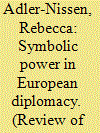

|
|
|
|
|
| Summary/Abstract |
National diplomacy is challenged by the rise of non-state actors from transnational companies to non-governmental organisations. In trying to explain these challenges, scholars tend to either focus on a specific new actor or argue that states will remain the dominant diplomatic players. This article develops an alternative Bourdieu-inspired framework addressing symbolic power. It conceptualises diplomacy in terms of a social field with agents (field incumbents and newcomers alike) who co-construct and reproduce the field by struggling for dominant positions. The framework is applied to the EU's new diplomatic service (the European External Action Service, EEAS), which is one of the most important foreign policy inventions in Europe to date. I show that the EEAS does not challenge national diplomacy in a material sense – but at a symbolic level. The EEAS questions the state's meta-capital, that is, its monopoly of symbolic power and this explains the counter-strategies adopted by national foreign services. The struggles to define the ‘genuine’ diplomat reveal a rupture in the European diplomatic field, pointing towards a transformation of European statehood and the emergence of a hybrid form of diplomacy. A focus on symbolic power opens up new avenues for the study of transformations of authority in world politics.
|
|
|
|
|
|
|
|
|
|
|
|
|
|
|
|
| 9 |
ID:
192860
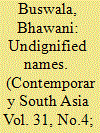

|
|
|
|
|
| Summary/Abstract |
Focusing on the experiences of the marginalised castes in North India, this article examines the use of given names in intercommunity micro interactions and how it shapes the practices of everyday humiliation. With ethnographic data from Dalit activist discourses as well as everyday life in an urbanising village in Rajasthan, this article analyses how the upper castes tend to deform the given names of the members of the Dalit community to produce undignified names, and how the community claims their right to be addressed with appropriate names. I engage with the complexity of the formation and use of undignified names by analysing their function in shaping the local political field to regulate participation in the public sphere and how they are linked to valuable names in the production of social distinctions and their economic benefits. Taking names as an important symbolic object, this article foregrounds the politics of humiliations in everyday intercaste vyavahar to understand the micro dynamics of caste reproduction and how it is negotiated and contested.
|
|
|
|
|
|
|
|
|
|
|
|
|
|
|
|
|
|
|
|
|